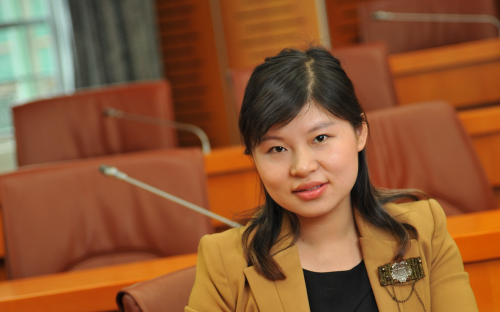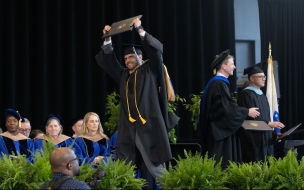She landed a summer internship at Guotai Junan Securities, the Shanghai-based financial services company. She worked in the fixed income branch in foreign exchange trading.
Before Yingzhen moved to Shanghai, she lived in Hubei province in Central China, where she finished a bachelor’s degree and a master’s degree in computer science.
Previously, she worked at a Chinese investment bank in IT program management.
Why did you decide to begin the MBA program at SAIF?
I worked in a financial organization on the “back stage”. I wanted to change my function and my work place, and enrich my financial and management knowledge.
Shanghai has almost the greatest potential of the financial markets in China. SAIF’s curriculum and career development suited me.
What’s the most valuable thing you learned studying for an MBA in Shanghai?
The most valuable thing I’ve got from SAIF is surely knowledge — not only from our fabulous teachers and tutors, but also from our classmates, school fellows and other MBA school students.
This includes not only financial or economic knowledge but also how to manage oneself, how to balance life [with work] and how to cooperate with other people.
You secured an internship at Guotai Junan Securities Management. How helpful was the SAIF MBA in this respect?
It surely was [helpful]. Firstly, as soon as we entered SAIF, [the business school] got us lots of interviews as part of our careers search, and helped with setting goals and planning.
Secondly, teachers helped us to revise our resumes and cover letters, typed them all into a fancy brochure, [and] sent the brochure to all [of] the financial institutions in Shanghai.
Thirdly, when we had company interviews, teachers held mock interviews with us to help improve our performance. With [of] all this help, lots of us finally got internships.
What was the most difficult part of the interview process?
The internship I worked needed both a financial background and computer science skills such as Excel VBA. During the interview, they asked me lots of financial questions but they had no idea about my VBA level. To prove my capability, I voluntarily displayed my recent work, which helped me get the internship.
How important was the internship for your career development?
I cannot emphasize enough how important the internships are in the career development of MBAs.
An internship is the best practical way to build the bridge of trust between students and employees, to not only show competence but also get insight into the employer.
What’s the best thing about working in Shanghai?
Shanghai has got lots of fancy companies. This city has a very bright future ahead.
The best thing in my viewpoint is I can get balanced career development and lifestyle in Shanghai. With the rapid progress in Shanghai, every one of us could find an opportunity to achieve our goals.
With the good living conditions in Shanghai, such as highly-qualified medical staff, teaching resources and various entertainments, we can live a good life by ourselves and try to realize our China Dream.
What are your plans for the future?
In the short-term, my objective is to find a chance to work as a fixed income trader or analyst in commercial banks or mutual funds.
In the long-run, as my trading and analysing abilities have enhanced, my goal is to work as a fixed income fund manager.
RECAPTHA :
3e
57
11
80








